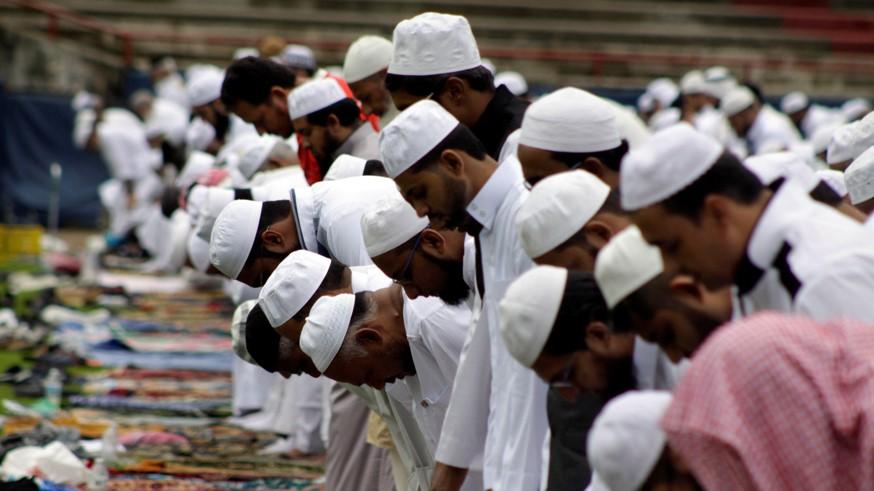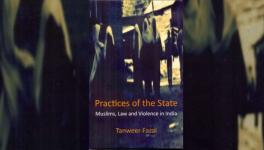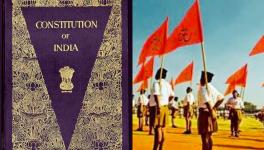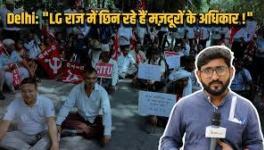Furore Over Noida Police Order Banning ‘Namaz’ in Park

Image Courtesy: The News India
The controversial order of the Noida police that said companies would be held liable if their Muslim employees offer Friday ‘namaz’ (prayer) at public parks in the city, created quite a furore with people accusing the law enforcement agency of bias and toeing the line of the Right-wing groups who have of late disrupted the weekly congregation across the national capital region (NCR).
Even as the order has been reportedly revoked, people have questioned why the diktat did mention other religious activities other than Friday prayers that are banned in parks. Who are the police afraid of?
“You are being informed that any religious activity – including the prayers offered on Friday – is not allowed to be performed in the Noida Authority Park in Sector 58. It has often come to notice that the Muslim employees of your company gather in the park to offer prayers. I have collectively asked them not to do so and there is no permission being given by the city magistrate to their application. Hence, it is expected that you – on your behalf – would inform your Muslim employees that they should not go to the park for offering namaz. If the employees of your company come to the park (for prayers), it would be considered that you did not made them aware about the same and you – the individual company – would be held liable,” read the notice addressed to the managers of firms.
The notices were issued by Sector 58 Station House Officer Pankaj Rai earlier this week.
Reacting to the issue, Vikram Singh, former director general of the UP police, said that anything that is happening at a public place, and that does not have a tradition becomes “illegal suo motu”, but if there is a popular and justified demand for a religious activity, “a practical officer should facilitate it because it it fundamental right to pray”.
“Every population in the state and across the country has a Festival Register. Whatever religious activities such as any congregation, aarti(Hindu religious ritual of worship in which light is offered to one or more deities), procession or anything extraordinary happens, it is recorded in the register. Anything that happens by way of tradition is permissible under law, and one is not expected to take permission for the same. For example, no permission is required for Tazia procession that has been going on for hundreds of years. The Festival Register faithfully incorporates that a gathering of say about 2,000 people will start at 4 in the evening, and reach Karbala (where it concludes) by the next morning. This is how the festival is celebrated, and there is no problem. If there is some obstruction and construction on the way of procession, it is also mentioned in the register, and it is the duty of the police and PWD (Public Works Department) to ensure safe passage of the procession,” he told Newsclick explaining the standard operating procedure.
However, he said that anything that is happening at a public place and that does not have a tradition and prior police permission becomes “illegal suo moto”. “Therefore, anything that is new will require a permission of the district magistrate to allow that to happen. Now, if there is a popular demand for a namaz or for an aarti, and if it is justified, I feel a practical officer would facilitate it because it our fundamental right to pray. If I start praying in my office premises, you will have objection; if start praying in public corridors, you have objections. Its your job to facilitate my prayer,” he said.
In the DGP’s office, the ex-top cop said, if somebody wants to observe fast, he is facilitated in a manner that he doesn’t get tough duties, and made to run in the parade. “The duty of the father figure is to ensure that if someone is observing fast, he will not take demanding work from him at the time of ‘sehri’ (pre-dawn meal) and ‘iftar’ (evening meal with which Muslims end their daily Ramadan fast at sunset). This is the tradition of the police. Every police line has a temple and a mosque so that one does not have to go outside and beg for a place to offer prayer. Similarly, it is the duty of every district magistrate and SP (Superintendent of Police) to provide an alternative place for prayers. If you feel that a public place is not suitable, then provide them another place. By no stage of imagination, a person who is offering prayers is going to create a law and order situation. Everything can be sorted out by negotiation, settlement and by offering a possible solution can be sorted out. You have a big heart, you will never have a problem,” he added.
SR Darapuri, former inspector general of the UP police, also said such orders can be given in the name of maintaining order, but there should be no “pick and choose”. “To ensure that the order is not disturbed at public places, the police is empowered to give such orders. It is welcome. It can’t be termed as nuisance. But the major question is why the same order is not given for all religious activities. When there is a pick and choose and discrimination, such questions are bound to arise. The main problem is the selective implementation of such rules,” he said.
He cited an instance that the Allahabad High Court had passed an order that all illegal religious constructions must be removed. “But neither the previous not the incumbent government took any action. So, there is no uniformity in implantation of these orders, such questions are likely to arise when there is some sort of discrimination,” he concluded.
Religious Hatred or Contempt?
Others consider the move as “communal hatred” or “communal contempt”.
Ujjwal Chowdhary, dean of media studies at Pearl Academy, said, “The pious Muslim population is offering namaz in a park without disturbing traffic and people, and without causing any nuisance otherwise. There is no reason why they should be prevented from exercising their fundamental right to pray and that too when it is once in a week. If this is nuisance, then what about the several kinds of temples, prayers and aartis being organised at crossroads in the peak of traffic. They are truly a nuisance. I am not talking like this just because it is the issue of prayer of a particular community. Any and every community in India where fundamental right to pray is guaranteed should allow such congregation if there is no public nuisance.”
Asked how does he interpret the police argument that such congregation is a potential threat to the communal harmony, he added, “It has been happening for ages without any protest from local inhabitants. The issue is being created by some fringe elements that are protesting today to create an issue to divert attention of the people from day to day problem that they are facing whether it is price rise, joblessness and law and order issue. In case of UP, law and order and urban amenities are major issues. To divert the attention, and take it to non-issue must be strongly refuted.
The argument by the police that swelling crowd in Friday prayers has become a threat to communal harmony is based on hypothesis and not on facts. There could be certain norms with regard to number of people who can be accommodated in the places and with regard to the nature of congregation, and community leaders can be informed regarding such norms. But imposing a blanket ban on a practice that has been going on for ages only stinks of communal hatred or communal contempt for a particular community and not love of law. There is no single record of any violence emanating after Friday prayers from such parks. There are many other issues that the police should take note of rather than this”.
Journalist and entrepreneur Irena Akbar says her India is not the one in which the Noida authorities tell companies to stop their Muslim employees from offering namaz in the parks. “My India is the one in which my former boss would tell me to pause work so that I could break my fast and offer namaz in the masjid (mosque) opposite our office in Delhi. My boss wasn’t Muslim. My India is the one in which my former colleague told me not to feel conscious about offering namaz in the office as I used to pray in my car when our office shifted to Noida (there was no masjid nearby). My colleague wasn’t a Muslim. My India is the one in which a Gurgaon-based family friend prepared iftaar for my fasting father (he was in transit; he was travelling from one city to another, and had dropped by to meet his friend). Our Gurgaon Aunty, a Punjabi Hindu lady, had prepared iftaar. She had placed a clean bed sheet on the floor so that my father could offer namaz. This is my India,” she said, concluding that “my Hindu friends, colleagues and neighbours have always respected my right to offer namaz. I know the Noida order is about offering namaz in public spaces, but I can’t help feel that the ordinary Indian, irrespective of religion, respects the other’s right to pray, be it in open or in private”.
Meanwhile, Noida District Magistrate has reportedly revoked the controversial order following the furore over the diktat. He also has assured companies that there would be no action against them if their Muslim employees are found praying namaz at public places.
Get the latest reports & analysis with people's perspective on Protests, movements & deep analytical videos, discussions of the current affairs in your Telegram app. Subscribe to NewsClick's Telegram channel & get Real-Time updates on stories, as they get published on our website.
























